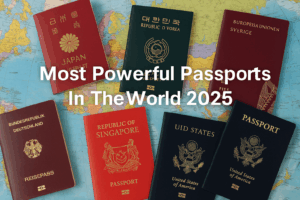The most powerful passports in the world 2025, including Singapore, open doors to greater global mobility, offering their holders visa-free or visa-on-arrival access to numerous countries.
Passport rankings have become an important measure of international freedom, influencing travel, business, and residency opportunities.
Every year, global indices assess and compare these travel documents, most notably the Henley Passport Index, The Passport Index, and Nomad Passport Index, widely recognized as the leading authorities on passport strength and cited by established news portals.
If you are looking to invest as an expat or high-net-worth individual, which is what I specialize in, you can email me (hello@adamfayed.com) or WhatsApp (+44-7393-450-837).
This includes if you are looking for a second opinion or alternative investments.
Some facts might change from the time of writing. Nothing written here is financial, legal, tax, or any kind of individual advice or a solicitation to invest.
In this article, we’ll explore the latest rankings, the factors that shape passport power, and what it means for travelers, expats, and investors worldwide.

What is the Most Powerful Passport in 2025?
According to the Henley Passport Index 2025, Singapore holds the most powerful passport in the world, offering visa-free access to 193 destinations globally.
Since 2018, Singapore has been juggling between the first and second rank as the most powerful passport in the world.
This level of access reflects Singapore’s robust diplomatic ties and its commitment to maintaining strong international relations.
However, passport rankings vary by methodology.
The Nomad Passport Index, which considers taxation of citizens, dual citizenship, and global reputation in addition to visa-free access and personal freedom, places Ireland in the top spot for 2025.
Meanwhile, the Arton Capital Passport Index, updated in real-time and focused purely on mobility scores, ranks the United Arab Emirates (UAE) first.
For expats and high-net-worth individuals, these rankings highlight different strengths. While Singapore offers sheer travel convenience, Ireland adds lifestyle and tax advantages, and the UAE provides fast-growing mobility perks through strategic diplomacy.
Holding such passports provides unmatched travel freedom, streamlining international business, relocation, and investment opportunities.
Top 10 Strongest Passports in the World 2025
The table below compares the top 10 passports in 2025 across all three major indices to give a well-rounded view of global passport strength.
| Rank | Nomad Passport Index | Arton Capital Passport Index | Henley Passport Index |
|---|---|---|---|
| 1 | Ireland | United Arab Emirates | Singapore |
| 2 | Switzerland, Greece | Spain | Japan, South Korea |
| 3 | Portugal | Sinagapore, France, Germany, Belgium, Finland, Italy, Denmark, Netherlands, Luxembourg, Portugal, Switzerland, Austria, Greece, Norway, Ireland | Denmark, Finland, France, Germany, Ireland, Italy, Spain |
| 4 | Malta, Italy | Sweden, Poland, Hungary, South Korea | Austria, Belgium, Luxembourg, Netherlands, Norway, Portugal, Sweden, |
| 5 | Norway, Luxembourg, Finland | Czech Republic, Estonia, Croatia, Slovakia, Japan, Liechtenstein | Greece, New Zealand, Switzerland, |
| 6 | Iceland, New Zealand, UAE | Slovenia, Latvia, New Zealand | Australia, United Kingdom, |
| 7 | Czech Republic, Denmark, Belgium, Slovenia, Netherlands, Germany | Malta, Lituania, Romania, Iceland, Canada, Bulgaria, Australia | Canada, Czechia, Hungary, Malta, Poland, |
| 8 | Latvia, sweden | Cyprus, Malaysia, United Kingdom, United States of America | Estonia, United Arab Emirates, |
| 9 | France, United Kingdom, Croatia, Romania, Estonia | Monaco | Croatia, Latvia, Slovakia, Slovenia, United States, |
| 10 | Monaco, Singapore, Cyprus, | Brazil | Iceland, Lithuania |
This year’s rankings highlight the continued strength of Asian and European passports in facilitating global mobility, with Singapore maintaining its top position.
European countries like Germany, Italy, and France also feature prominently, underscoring the benefits of EU membership and strong global ties.
What Contributes to a Strong Passport?
While the Henley Passport Index, Nomad Passport Index, and Arton Capital Passport Index each apply slightly different metrics, they all highlight the same core factors that enhance global mobility:

Bilateral visa agreements: Countries with strong diplomatic ties are more likely to negotiate reciprocal visa-free travel. These agreements directly boost a passport’s rank across all major indices.
Political stability: Nations with consistent and secure governance are generally viewed as lower risk, which makes other countries more willing to offer lenient visa policies.
Economic strength: Wealthier countries tend to be perceived as lower sources of illegal immigration, increasing their leverage in securing visa waivers.
Global diplomatic engagement: Membership in international bodies and active foreign relations lead to wider travel access, an element reflected in both Henley’s visa-focused model and Nomad’s broader evaluation.
Personal and financial freedoms: Unique to the Nomad Passport Index, this includes tax advantages, reputation, and dual citizenship flexibility—factors important to expats and global entrepreneurs.
Together, these factors enhance a passport’s global mobility by minimizing the need for pre-arranged visas.
Top 10 Weakest Passports in the World 2025
According to data from the three indices, Afghanistan is the weakest passport in 2025. The following passports join the Asian country among the weakest in 2025:
| Rank | Arton Capital Passport Index | Nomad Passport Index | Henley Passport Index |
|---|---|---|---|
| 1 | Afghanistan, Syria | Afghanistan | Afghanistan |
| 2 | Iraq, Somalia | Yemen | Syria |
| 3 | Pakistan | Eriteria | Iraq |
| 4 | Yemen | Iraq | Pakistan, Yemen |
| 5 | Palestinian Territories, Bangladesh | Pakistan | Somalia |
| 6 | North Korea, Eritrea | Syria | Nepal |
| 7 | Sudan, Libya | Somalia | Palestinian Territory, Libya, Bangladesh |
| 8 | Congo (Dem. Rep.) | North Korea | North Korea, Eritrea |
| 9 | Nepal, South Sudan, Nigeria | Libya | Sudan, Sri Lanka, Iran, |
| 10 | Iran | Palestinian Territory | South Sudan |
These rankings reflect a combination of factors, including ongoing conflicts, political instability, and limited diplomatic relations.
For instance, Afghanistan remains at the bottom due to persistent security challenges and international isolation.
Similarly, countries like Syria and Iraq face restrictions stemming from prolonged conflicts and concerns over terrorism.
Such limitations significantly impact the citizens of these nations, restricting their ability to travel for business, education, or personal reasons.
Regional Trends in Passport Rankings 2025
The 2025 passport rankings from the three indices reveal distinct regional trends that highlight how diplomatic strategy, global perception, and domestic policy shape international mobility.
Asia: Ascending Mobility
Singapore tops both the Henley and Arton indices, with access to 193 destinations, reinforcing Asia’s leadership in travel freedom.
Japan and South Korea also remain high performers across all indices, while China has steadily improved in Henley, climbing to 61st with 83 visa-free destinations—though it still ranks low in Nomad’s broader criteria.
Europe: Resilient but Slightly Shifting
European Union countries dominate the top 10 in all three rankings, though Nomad Capitalist places a stronger emphasis on personal freedom, taxation, and dual citizenship flexibility.
Ireland, for example, ranks first in the Nomad Index thanks to its EU benefits and friendly expat environment, while France, Germany, and Italy continue to perform strongly in Henley and Arton due to extensive visa-free access.
Middle East: UAE’s Impressive Surge
The UAE ranks 8th in Arton Capital’s Passport Index, reflecting its exceptional rise over the past decade.
Though lower in Henley and Nomad, its visa-free access to 184 destinations underscores a diplomatic strategy geared toward mobility expansion.
Africa: Persistent Limitations
Most African nations remain at the lower end of all three indices.
Issues such as limited visa agreements and high rejection rates contribute to weaker passport power.
Guinea-Bissau and Ghana, for example, face some of the highest Schengen visa denial rates, emphasizing the region’s ongoing challenges in improving global access.
Americas: Mixed Fortunes
The United States ranks in the top 10 in all three indices but has slipped from earlier positions due to reduced visa-free negotiations and tighter immigration policies.
Canada, while still strong, sees a slightly better showing in the Nomad Index, where lifestyle and taxation considerations are factored alongside access.
These regional patterns illustrate that passport strength is no longer just about visa-free travel—it’s about broader lifestyle freedoms, financial flexibility, and geopolitical trustworthiness.
Why Passport Rankings Matter for Travelers and Global Citizens
Benefits of a Strong Passport
The importance of a strong passport goes beyond convenience.
For global citizens, expats, and high-net-worth individuals, a global mobility passport provides tangible advantages:
- Easier travel: Visa-free and visa-on-arrival access reduce paperwork and waiting times.
- Greater global mobility: Seamless entry into more countries enables flexible relocation, spontaneous trips, and access to new markets.
- Business and investment opportunities: A powerful passport opens doors to cross-border investments, real estate purchases, and international business ventures.
Whether you’re an investor exploring overseas assets, a digital nomad seeking new hubs, or an expat moving between countries, having one of the best passports for global mobility enhances freedom and opportunity.
Key Takeaways and 2026 Outlook
The most powerful passports in the world 2025 highlight continued dominance by Singapore, Japan, and leading European nations, while countries like the UAE are climbing rapidly.
These shifts reflect broader changes in diplomacy, economic partnerships, and global policy.
As we approach 2026, further movement in the rankings is likely, driven by new visa agreements and geopolitical developments.
For globally mobile individuals, keeping track of these changes is crucial to navigating international opportunities and risks.
Pained by financial indecision?

Adam is an internationally recognised author on financial matters with over 830million answer views on Quora, a widely sold book on Amazon, and a contributor on Forbes.



